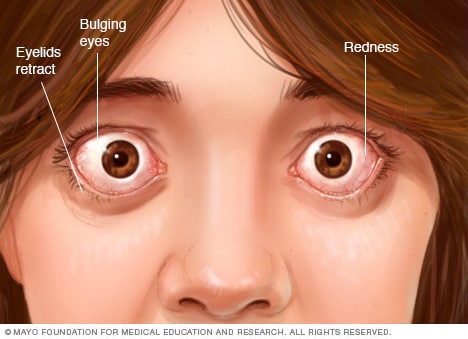
The thyroid is an organ in your neck that is responsible for producing thyroid hormone. Thyroid hormones are responsible for many functions in the body, and require iodine in order to be created. Too much or too little of this hormone can be very problematic for the individual because of the vast amount or organs that thyroid hormone affects.
Graves disease is an autoimmune disease that causes too much thyroid hormone to be produced. It is problematic because it leads to a hypermetabolic state in the body that produces many other issues and can lead to a very serious complications called thyroid storm. Continue reading to find out more about Graves disease and how it can negatively impact your sleep.
What is Graves disease?
Graves disease is an autoimmune disease, which means the body produces antibodies that attack its own tissues. Antibodies are normally released in response to some sort of virus or bacterial infection. However, in certain cases, antibodies attack their own tissues without any viruses are bacteria present.
Graves disease is one of those disorders where the antibodies attack the receptors on the thyroid, which over stimulates them to make more thyroid hormone than the body needs. The production of thyroid hormone is controlled by a part of the brain called the hypothalamus. It releases a hormone called thyroid stimulating hormone, or TSH. TSH goes to the thyroid and begins creating thyroid hormone. When there is enough thyroid hormone, then the thyroid hormone goes back to the hypothalamus and turns it off so it stops producing TSH.
In Graves disease, there is so much thyroid hormone, that there is very little TSH. The antibodies turn the thyroid on and there is nothing to turn it off.
Symptoms of Graves disease
Symptoms of Graves disease are multifactorial because they affect the entire body. The most obvious sign of Graves disease is that they eyes begin protruding because the muscles around the eye begin to enlarge which pushes the eye outward. In addition to that, there is an enlarged mass in the neck, called a goiter. These are two give away signs of Graves disease.

Prior to these signs developing, however, one may notice other changes including:
- weight loss
- palpitations
- rapid and irregular heart rate
- sweating
- menstrual changes
- feelings of jitteriness or anxiety
- muscle weakness and fatigue
If you begin to notice any of these signs it's important to talk with your physician about it because these are signs of Graves disease.
Graves disease impact on sleep
Graves disease has very bothersome symptoms that can negatively impact sleep. The heart palpitations, racing heart rate, jittery and anxious feelings are all symptoms that can make it very difficult to go to sleep.
There is also this overwhelming feeling of being tired which can cause people to sleep during the day, which reduces their ability to sleep soundly throughout the night, throwing off their sleep schedule.
Overactive thyroid may also lead to increased urination. When this happens at night, it is referred to as nocturia and can be very disruptive when you have to go to the bathroom several times throughout the night.
Night sweats are another common issue in Graves disease because of the hypermetabolism that is taking place in your body. When you're hot at night, it's very difficult to get comfortable and get quality sleep.
Treatments for Graves Disease
If you are diagnosed with Graves disease, there may be a few different medications that your physician will put you on. One is called methimazole, which is a medication designed to reduce the amount of thyroid hormone. Another is called propylthiouracil (PTU) which functions in the same manner.
PTU may be a bit more protective of a severe outcome like a thyroid storm, however, it is very toxic for the liver, so methimazole is a great option, unless you are attempting to get pregnant. Then PTU is the better option for the first trimester and then methimazole has a lower risk of complications.
In addition to these medications, your physician may also prescribe a beta blocker which will help with symptom management.
If you are having trouble sleeping and have Graves disease, or suspect you may, then please click the orange button below to take a free online sleep test.
https://www.sleepfoundation.org/physical-health/thyroid-issues-and-sleep#:~:text=Hyperthyroidism%20(overactive)%20can%20cause%20difficulty,of%20which%20can%20disrupt%20sleep.

